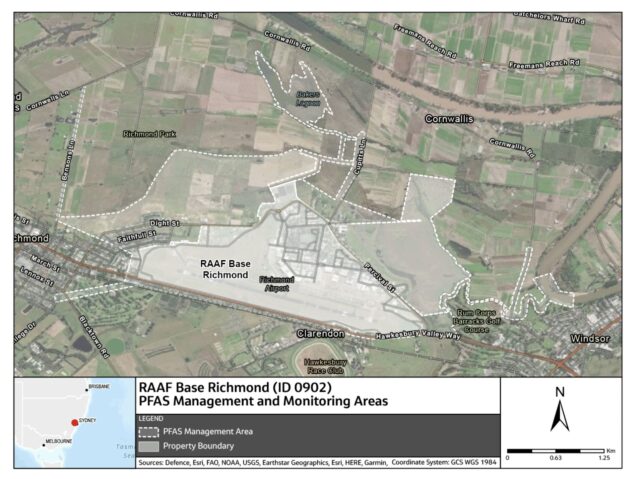Residents can apply for PFAS soil testing after Defence Department acknowledges spread
https://hawkesburypost.com.au/residents-can-apply-for-pfas-soil-testing-after-defence-department-acknowledges-spread/
Richmond Residents can apply for soil testing for PFAS Contamination following Defence Department acknowledgment of spread
Richmond residents will be able to apply to have their soil tested for poisonous PFAS chemicals after the Defence Department finally admitted that flooding in recent years has seen the so-called “forever” chemicals spread over a larger area.
The result was a rare concession from the Department of Defence which held a briefing on the chemicals in Richmond this week organised by Federal Member for Macquarie Susan Templeman, who is one of the few local politicians showing concern about the issue. Defence has known about the dangers of PFAS using its fire firefighting foams for decades, before it stopped last decade.

Asked if there had been any research on the effects of PFAS moving from property to property due to the floods, a Defence remediation contractor Steve Cornish answered “no.”
“If someone wants their property tested they can put in a request to Defence and we can definitely take those requests on a case by case basis”, he added.
At times the information presented in the briefing was confusing. There were concerns at the evening briefing – attended by about 100 residents – that there was still not enough information or testing on PFAS chemicals in the district. They were also told that Sydney Water – which was a notable absentee from the meeting – has not tested for PFAS in the local water supply since 2019.
Assistant Defence Minister Matt Thistlethwaite apologised to residents; “The first thing I want to do is to say sorry to you, the local residents, for the inconvenience and disruption that has been caused to your lives from PFAS contamination in the local community. We know that PFAS is the forever chemical and it takes a long time to break down in the environment, thankfully we are not using it anymore.”
However, the meeting heard that the health implications of PFAS were less well known. EPA Unit Head Operations Corrie Ford said that the health advice varied depending on where people were located.
“Basically the NSW government has taken the precautionary principle that we just don’t know enough about PFAS and its effects on the human body so the government has taken (the view)…that it is better to try and reduce your exposure to PFAS. The main way that PFAS gets into the human body is via the consumption of food or by drinking water, so it’s mainly just to try limit people’s exposure,” Ford said.
Thistlethwaite told the Hawkesbury Post that people who owned PFAS contaminated land should not consume the produce from that land. However, he added that; “the health advice was that it was still safe to sell produce that had come from such lands into the market and the government accepts the advice that has been prepared by the Department of Health and the Environmental protection Authority.”
“…At the moment there is no plan to change that health advice because that is considered the best advice that the government has at the moment,” he said.
Defence said that their investigations showed that PFAS mainly moves off the base through surface water drains to the east of the base and that surface water was one of the greatest sources of PFAS contamination. PFAS in surface water and soil varied with some new and maximum levels detected.
However, investigations had also identified elevated PFAS concentrations in groundwater on the northern boundary of the base, possibly due to heavy and prolonged rainfall. PFAS in ground water above historic levels were also identified between the Sewage Treatment Plant and Bakers Lagoon.
Defence has done testing at a series of sites further afield from the bases and found elevated levels of PFAS, yet there has been no thorough testing of the area since 2019. Thistlethwaithe said more general testing outside the study area would only be undertaken if there was evidence that the plume had moved and currently there was no such evidence.
As well as Templeman there was a representative from State Member for Hawkesbury Robyn Preston’s office. There were no Hawkesbury councillors at the briefing.
Hawkesbury City Council’s ongoing response to issues around PFAS is that it is a matter for the Defence department and has admitted that it does not test for PFAS at its sewerage recycles plant where it produces “grey water” for irrigation.
Defence said the remediation works at the base that began in 2021 have been successful and further works are planned for 2023 and 2024. There are 28 Defence sites throughout Australia that are contaminated with PFAS.
You can read the full presentation given by Defence here: https://www.defence.gov.au/about/locations-property/pfas/pfas-management-sites/raaf-base-richmond